John Janaro's Blog, page 145
September 3, 2019
Justice and Anger in Hong Kong's 'Anonymous War'

Justice and Anger in Hong Kong's Anonymous War: reflections of a not-very-knowledgeable but sympathetic old man from far away...
By JJ
The school year in Hong Kong has begun... with a massive student strike. As the ongoing civil protest movement enters its fourth month, it begins to look more and more like an unprecedented series of events that will only be understood in retrospect.
It may indeed be many, many years before we begin to see the significance of this widespread, sustained popular uprising. Immense energies have been expended by people from every sector of society, and new modes of collaboration have been invented that have generated large coordinated purposeful actions, without the emergence (as yet) of any leadership. Media and communications technology are playing a big role in this apparently "faceless" movement, as protesters plan activities on the internet, gather at agreed-upon locations, and engage in creative and provocative demonstrations.
This is supposed to be a "nonviolent movement." It certainly appeared that way in June, when millions took to the streets in opposition to a bill proposed in the Legislative Council that would have authorized extradition to mainland China of alleged criminals for prosecution.
As the Summer passes, however, a fierce and complicated struggle is being played out in this unique city (and on video screens the world over). For those of us who watch from afar, it has been inspiring, but also frightening and perplexing. Since 2014, we have been seeing the historic rise of a generation of courageous young people willing to risk everything by taking a stand for the noble cause of human dignity and freedom, and against the machinations of the world's largest, most controlling and soul-suffocating dictatorship.
We are, of course, rooting for these freedom fighters. Oh my, yes! But we are also worried about them. We are seeing more and more videos of barracaded protesters - clad in black, wearing gas masks, and some of them hurling projectiles - facing off against an ominous deployment of police in full riot gear (looking like a dystopian Darth Vader army) pumping preposterous quantities of tear gas, pepper spray, and other "non-lethal" (but far from harmless) materials into the crowd. In some videos, groups from the protester side break through their barriers and charge at the police lines with long metal poles, and we see scenes of hand-to-hand combat with police batons.
As I noted in a previous post, "the revolution is being televised." Videos of huge peaceful protests and hand-to-hand "human chains" illuminating the night with cellphone lights are awesome. But the "battle scenes" are more alarming, and they give the impression that this is not going to end well.
Make no mistake: the police and Hong Kong's pro-Beijing government are responsible for initiating and escalating this situation of conflict, beginning with the first cannister of tear gas they fired at defenseless protesters peacefully assembled five years ago at the start of what became known as the "Umbrella Movement." Since then, there have been continual tensions between government officials and large groups of dissenters. The long, snake-like arm of Beijing barely even tries to hide its egregious manipulation of everything it can reach.
Reporters (other than those associated with the Chinese propaganda machine) have provided for the world a context that explains the widescale public outrage against the HK law enforcement sector's brutal tactics. International human rights organizations have condemned ongoing acts of police repression. Also clear is the tightening grip of Beijing's claw trying to suffocate what remains of the civil institutions of a free society in Hong Kong. Now, faceless groups of (mostly) young people are desperately trying to fight back. But it's not an "even fight."
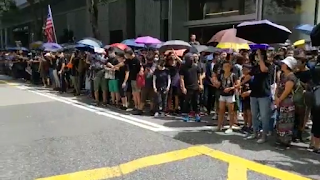 It's remarkable that Hong Kong's democracy movement has remained mostly nonviolent for so long. But during this long hot Summer, protesters (some of them, at least) have grown increasingly angry and aggressive. This is understandable but it's a reason for concern.
It's remarkable that Hong Kong's democracy movement has remained mostly nonviolent for so long. But during this long hot Summer, protesters (some of them, at least) have grown increasingly angry and aggressive. This is understandable but it's a reason for concern.What is happening to the focus on the core principles of nonviolence - its reliance on self-discipline, sacrifice, bringing evils to light, and the conversion of enemies into friends? This most radical level of nonviolence, of course, is very difficult to sustain in a prolonged conflict. It is especially frustrating when the enemy (the Chinese Communist Party) is unnaturally stubborn, or worse, offers false friendship. Many people are likely to give up altogether in the long run, and it would be harsh to blame them. They just want to live their lives in whatever space of freedom they can carve out for themselves. But widespread disillusionment will defeat the cause. Beijing and its local puppets are counting on it.
It would appear that some desperate Hong Kong people, driven by a deeply ambivalent anger that mingles burning frustration with the fires of their passion for freedom and justice, are seeking to fight violence with violence, to return hatred for hatred. This cannot bear good fruit. And it only plays into Beijing's hand.
Others might seek to reframe their struggle in terms of legitimate self-defense against an alien regime. They might try to include the justifiable application of proportionate physical force when necessary (some already appear to be inclined toward this option). In principle, when all other means have proved futile, an argument can be made for armed resistance in accordance with strict criteria of justice, restraint, the requirements of the common good, and other aspects of what is known as the "just war" paradigm. The use of force to defend against and repel an unjust aggressor is not "violence," as long as it is not aimed at the degradation of enemies as human persons (many Western "conventions" of warfare, such as humane treatment of POWs, etc find their roots here). In any case, it's very difficult to carry out consistently in practice.
Here the current present movement in Hong Kong has a basic problem. It lacks the leadership and positive social coherence required (at the very least) to assume "public authority" for directing the use of force. There are unifying themes and aspirations (and in the CCP a deplorable, unscrupulous enemy) but there is no leadership. Indeed, in the late-night conflicts, the masked protesters themselves are unidentifiable even to one another, and the crowd dressed in black may include undercover police, embedded reporters, and possibly agitators with their own agendas. Some of the recent protest "disruptions" have crossed the line between demonstrative civil disobedience and lawless vandalism. If reports are true that some protesters smashed up city infrastructure such as subway stations, that would be most unfortunate. We have all seen the horrific videos of police storming a subway station and beating everyone in sight; the public has a right to demand that perpetrators of this outrage and all those responsible be brought to justice.
But individuals wearing masks have no right to escalate the level of anarchy by further acts of violence. We hope that such actions come from fringe elements, or perhaps even 'fake protesters' planted to deliberately perpetrate violence in order to smear the movement - it's hard to believe that Beijing itself has not infiltrated the protest and put its own paid agents in the streets, as well as among the police.
All the anger and desperation that are being vented now can be appreciated by people in free societies and their governments, even if they lead to mistakes and some unruly behavior in the streets. But Hong Kong's protest movement must resist the temptation to go to war. There is little room for even the semblance of error in this direction. Without a structure of verifiable accountability, physical force too easily degenerates into open violence (this is precisely the point protesters are rightly trying to make regarding the behavior of the police). If this happens, the anonymous resistance will devolve into guerrilla warfare, which is even harder to direct, more likely to turn toward vengeance and destruction, break into factions, perpetuate increasing cycles of violence, and get a lot of people killed.
It should be noted that thus far no one had died as a direct result of actions by either side in the past three months. This is astonishing (especially to those of us living in the USA, who have become sadly accustomed to the bloody casualties of increasingly frequent random acts of violence in streets, schools, and public venues). In Hong Kong's "Summer of unrest," there have been many injuries, but no fatalities ... yet. That does not mean that the violence lacks intensity. It is deplorable that so much of it comes from civil agents whose office it is to protect the people. But their tactics are at the service of authorities who are ultimately answerable to Beijing's politburo. The HK government's violence and manipulation are enacting a political script. Under the pretext of perpetuating a strange conception of the 'rule of law,' it aims not to kill but to repress political dissent and create a climate of fear and conformity while mainland China carries out its agenda to gradually take over the city.
In the streets, nothing the protesters have done thus far comes anywhere near justifying the ferocious behavior of the Hong Kong Police, who seem to think that crowd-control is best achieved by 'preventive first strikes' that are outrageously disproportionate to anything a crowd could conceivably do. They do the opposite of "de-escalating" potentially volatile situations. On the contrary, those who are deployed at demonstrations seem to provoke more danger and conflict. If the people have lost patience, it's because they have been goaded and prodded relentlessly by a police force that answers to no one... or worse, one that does the bidding of Beijing.
The protesters are also not easily distinguished and held accountable, which only strengthens the pretext of those bent on indiscriminately repressing them. Clearly some of protesters are far from being angels. But it's difficult to identify who might be responsible for objectionable actions or tendencies. It's hard to gage the spirit of the protest movement, its strength, or what internal disagreements might lie behind its united front. The people are anonymous. They have been driven to it for their own safety's sake. We don't know them. Often they don't even know one another. Who knows what direction they will take if they survive the current crisis? Now more than ever, the protest movement needs people who think things through.
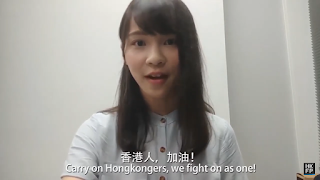 Agnes Chow TingWe do know the leaders from the pro-democracy groups, especially those who emerged from the 2014 student led "Umbrella Movement." Joshua Wong, Agnes Chow Ting, and other brave young people have grown up in the last five years (just like our own kids).
Agnes Chow TingWe do know the leaders from the pro-democracy groups, especially those who emerged from the 2014 student led "Umbrella Movement." Joshua Wong, Agnes Chow Ting, and other brave young people have grown up in the last five years (just like our own kids).They have tried the political process and have been stonewalled. They are participants and supporters of the current movement, but are not its leaders. Some were recently arrested in a gratuitous fashion, as if the government - frustrated by efforts to crush a movement without visible leadership - just couldn't resist the urge to focus the blame on a few faces. We can be sure that the government and its CCP masters will eventually find scapegoats who will have much to suffer, and who will need our prayers, concern, and advocacy. We may be able to help them. We can at least recognize the courage of their stand, their witness to the value of the human person.
Even though it lacks conventional leadership, the Hong Kong protest movement has remained clear and unified in affirming its demands (see below), which seem eminently reasonable: they want the real autonomy secured by the treaty that established Hong Kong's current status in 1997; they want free and fair elections of their own government, an independent investigation into police brutality, the legitimization of their movement, and the complete unambiguous withdrawal of the extradition bill from the legislative agenda. Beijing, however, has also openly made its view clear: Hong Kong is "a Chinese city" and it had better get used to being run politically like any other Chinese city.
Ay, there's the rub.
Because Hong Kong is not like any other Chinese city ... not yet. It was separate from the China of Mao Zedong's revolution and its ravages, and from the China of the Tiananmen Square massacre of 1989. It has only been under Chinese control (a very peculiar, delicately negotiated control) since 1997. Here is where the origin of the tensions can be found.
Hong Kong today supposedly holds a "special autonomous status," which China agreed to preserve "for fifty years" (i.e. through the year 2047) back in 1997 when the former British colony was handed over to Chinese control. This is what accounts for the "one country, two systems" explanation of Hong Kong's status. Theoretically, it is 'part of China' while retaining its own economic system (and status as a global financial center), its own framework of civil liberties (including freedom of press, assembly, and religion), and its own domestic political and juridical institutions.
The agreements that led up to the handover in 1997 involved a collection of awkward negotiated compromises between Britain and mainland China. The whole process leaned heavily on the "promises" of a Leninist one-party-State whose reputation for lying and cheating is notorious even by modern political standards. Not surprisingly, the Chinese Communist Party-state rigged Hong Kong's supposedly autonomous politics from the start. Beijing effectively controls the selection of Hong Kong's "Chief Executive" and the majority of its Legislative Council (there are processes through which this is done, but Beijing has them firmly under control). Less than half of the LegCo is elected by the people. Pro-democracy candidates dominate here, but at best they can only be a temporary brake to slow down the speed of Beijing's determination to swallow the city into the one system of New China.
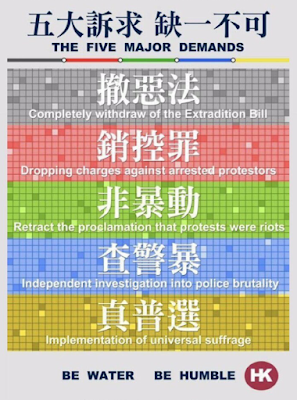 Protest Movement demands, circulated on the internetCan this protest movement do anything better for Hong Kong's future?
Protest Movement demands, circulated on the internetCan this protest movement do anything better for Hong Kong's future?The New China has harnessed the engines of material prosperity (without scruples) while preserving one key feature of Marxism: subjection and control of persons, subsuming of the personality to a collectivist identity. This identity, in turn, is (thanks to Lenin) interpreted and imposed by an elite group, the Party dictatorship, which - in vast China - has effectively become a pervasive quasi-imperial bureaucracy.
This so-called "Communist Party" endures on the strength of a fierce nationalism that feeds (like a parasite) off China's ancient traditions as much as its current material powers. It aims to impose its version of Chinese nationalism throughout its domains. It promises material comfort and prosperity within an exaltation of the supremacy of the Nation-State as defined by the Party. Quite simply, China today embodies the ideal of Fascism. This is the monster that Hong Kong's protesters must grapple with. What hope do they have?
No matter what they do, they will probably lose the current battle. Many will go to jail or be otherwise socially marginalized. But if they can resist the temptation to turn to violence, their stand will be remembered and honored. They can use the time to learn from mistakes and to search for the roots of human freedom, for the source of the human person - that which gives the person an inviolable dignity that cannot be subordinated to any ideology.
Herein lies Hong Kong's path to freedom, the hope of Hong Kong people for a free society. It is a long, arduous path, but it remains possible.
It is a path for all of us. Hong Kong people can help to point us in the right direction.
Published on September 03, 2019 20:30
Justice and Anger in Hong Kong's Anonymous War

The school year in Hong Kong has begun... with a massive student strike. As the ongoing civil protest movement enters its fourth month, it begins to look more and more like an unprecedented series of events that will only be understood in retrospect.
It may indeed be many, many years before we begin to see the significance of this widespread, sustained popular uprising. Immense energies have been expended by people from every sector of society, and new modes of collaboration have been invented that have generated large coordinated purposeful actions, without the emergence (as yet) of any leadership. Media and communications technology are playing a big role in this apparently "faceless" movement, as protesters plan activities on the internet, gather at agreed-upon locations, and engage in creative demonstrations.
This is supposed to be a "nonviolent movement." It certainly appeared that way in June, when millions took to the streets in opposition to a bill proposed in the Legislative Council that would have authorized extradition to mainland China of alleged criminals for prosecution.
As the Summer passes, however, a fierce and complicated struggle is being played out in this unique city and on video screens the world over. For those of us who watch from afar, it has been inspiring, but also frightening and perplexing. We are seeing the historic rise of a generation of courageous young people willing to risk everything by taking a stand for the noble cause of human dignity and freedom, and against the machinations of the world's largest, most controlling and soul-suffocating dictatorship.
We are, of course, rooting for these freedom fighters. Oh my, yes! But we are also worried about them. We are seeing more and more videos of barracaded protesters - clad in black, wearing gas masks, and some of them hurling projectiles - facing off against an ominous deployment of police in full riot gear (looking like a dystopian Darth Vader army) pumping preposterous quantities of tear gas, pepper spray, and other "non-lethal" (but far from harmless) materials into the crowd.
Make no mistake: the police and Hong Kong's pro-Beijing government are responsible for initiating and escalating this situation of conflict, beginning with the first cannister of tear gas they fired at defenseless protesters five years ago at the start of what became known as the "Umbrella Movement." Since then, there have been continual tensions between government officials and large groups of dissenters. The long, snake-like arm of Beijing doesn't even try to hide it's egregious manipulation of everything it can reach.
 It's remarkable that Hong Kong's democracy movement has remained mostly nonviolent for so long. But during this long hot Summer, protesters (some of them, at least) have seemed to grow increasingly angry and aggressive. This is understandable but it's a reason for concern. There is the chance that the core principles of nonviolence - its reliance on self-discipline, sacrifice, bringing evils to light, and the conversion of enemies into friends - will be lost. The most radical level of nonviolence is very difficult to sustain in a prolonged conflict. It is especially frustrating when the enemy (the Chinese Communist Party) is unnaturally stubborn, or worse, offers false friendship. Many people are likely to give up in the long run, and it would be harsh to blame them. They just want to live their lives in whatever space of freedom they can carve out for themselves. But widespread disillusionment would defeat their cause. Beijing and its local puppets are counting on it.
It's remarkable that Hong Kong's democracy movement has remained mostly nonviolent for so long. But during this long hot Summer, protesters (some of them, at least) have seemed to grow increasingly angry and aggressive. This is understandable but it's a reason for concern. There is the chance that the core principles of nonviolence - its reliance on self-discipline, sacrifice, bringing evils to light, and the conversion of enemies into friends - will be lost. The most radical level of nonviolence is very difficult to sustain in a prolonged conflict. It is especially frustrating when the enemy (the Chinese Communist Party) is unnaturally stubborn, or worse, offers false friendship. Many people are likely to give up in the long run, and it would be harsh to blame them. They just want to live their lives in whatever space of freedom they can carve out for themselves. But widespread disillusionment would defeat their cause. Beijing and its local puppets are counting on it.There is the possibility that some desperate Hong Kong people, driven by an anger that mingles with the fires of their passion for justice, might seek to reframe their struggle in terms of legitimate self-defense against an alien regime. They might try to include the justifiable application of physical force when necessary (many already appear to be inclined toward this option). But the present movement lacks the leadership and positive social coherence required (at the very least) to assume "public authority" for directing the use of force. It appears (on global video screens, and with the help of China's huge propaganda machine) that some of the recent protest "disruptions" walk a fine line between demonstrative civil disobedience and lawless vandalism. (If reports are true that some protesters smashed up a subway station, that would be most unfortunate. We hope that such events come from fringe elements, or perhaps even 'fake protesters' planted to deliberately perpetrate violence in order to smear the movement - it's hard to believe that Beijing has not infiltrated the protest and put its own paid agents in the streets, as well as among the police.)
In any case, there is little room for even the semblance of error in this direction. Without a structure of verifiable accountability, physical force too easily degenerates into open violence (this is precisely the point protesters are rightly trying to make regarding the behavior of the police). If this happens, the anonymous resistance will devolve into guerrilla warfare, which is even harder to direct, more likely to turn toward vengeance and destruction, break into factions, perpetuate increasing cycles of violence, and get a lot of people killed.
It should be noted that thus far no one had died as a result of actions by either side in the past three months. This is astonishing (especially to those of us living in the USA, who have become sadly accustomed to the bloody casualties of random non-political acts of violence). In Hong Kong's "war," there have been many injuries, but no fatalities ... yet. That does not mean that the violence lacks intensity. From what we have seen, it's clear that so far the violence has emanated predominantly (indeed overwhelmingly) from one side. Under the pretext of perpetuating a strange conception of the 'rule of law,' it aims not to kill but to repress political dissent and create a climate of fear.
In the streets, nothing the protesters have done thus far comes anywhere near justifying the ferocious behavior of the Hong Kong Police, who seem to think that crowd-control is best achieved by 'preventive first strikes' that are outrageously disproportionate to anything a crowd could conceivably do. If the people have lost patience, it's because they have been goaded and prodded relentlessly by a police force that answers to no one... or worse, one that does the bidding of Beijing.
The protesters are also not easily distinguished and held accountable, which only strengthens the pretext of those bent on indiscriminately repressing them. Clearly not all protesters are angels. But it's difficult to identify who might be responsible for objectionable actions or tendencies. It's hard to gage the spirit of the protest movement, its strength, or what internal disagreements might lie behind its united front. The people are anonymous. They have been driven to it for their own safety's sake. We don't know them. Often they don't even know one another. Who knows what direction they will take if they survive the relentless pressures against them? Now more than ever, the movement needs people who think things through.
 Agnes Chow TingWe do know the leaders from the pro-democracy groups, especially those who emerged from the 2014 student led "Umbrella Movement." Joshua Wong, Agnes Chow Ting, and other brave young people have grown up just like our own kids.
Agnes Chow TingWe do know the leaders from the pro-democracy groups, especially those who emerged from the 2014 student led "Umbrella Movement." Joshua Wong, Agnes Chow Ting, and other brave young people have grown up just like our own kids.They have tried the political process and have been stonewalled. They are participants and supporters of the current movement, but are not its leaders. Some were recently arrested in a gratuitous fashion, as if the government - frustrated by efforts to crush a movement without visible leadership - just couldn't resist the urge to focus the blame on a few faces. They will find scapegoats who will have much to suffer, and who will need our prayers, concern, and advocacy. We may be able to help them. We can at least recognize the courage of their stand, their witness to the value of the human person.
Even though it lacks conventional leadership, the Hong Kong protest movement remains clear and unified in affirming its demands (see below), which seem eminently reasonable: they want the real autonomy secured by the treaty that established Hong Kong's current status in 1997; they want free and fair elections of their own government, an independent investigation into police brutality, the legitimization of their movement, and the complete unambiguous withdrawal of the extradition bill from the legislative agenda. Beijing, however, has also openly made its view clear: Hong Kong is "a Chinese city" and it had better get used to being run politically like any other Chinese city.
Ay, there's the rub.
Because Hong Kong is not like any other Chinese city ... not yet. It was separate from the China of Mao Zedong's revolution and its ravages, and from the China of the Tiananmen Square massacre of 1989. It has only been under Chinese control (a very peculiar, delicately negotiated control) since 1997. Here is where the origin of the tensions can be found.
Hong Kong today supposedly holds a "special autonomous status," which China agreed to preserve "for fifty years" (i.e. through the year 2047) back in 1997 when the former British colony was handed over to Chinese control. This is what accounts for the "one country, two systems" explanation of Hong Kong's status. Theoretically, it is 'part of China' while retaining its own economic system (and status as a global financial center), its own framework of civil liberties (including freedom of press, assembly, and religion), and its own domestic political and juridical institutions.
The agreements that led up to the handover in 1997 involved a collection of awkward negotiated compromises between Britain and mainland China. The whole process leaned heavily on the "promises" of a Leninist one-party-State whose reputation for lying and cheating is notorious even by modern political standards. Not surprisingly, the Chinese Communist Party-state rigged Hong Kong's supposedly autonomous politics from the start. Beijing effectively controls the selection of Hong Kong's "Chief Executive" and two thirds of its Legislative Council (there are processes through which this is done, but Beijing has them firmly under control). Only one third of the LegCo is elected by the people. Pro-democracy candidates dominate here, but at best they can only be a temporary brake to slow down the speed of Beijing's determination to swallow the city into the one system of New China.
 Protest Movement demands, circulated on the internetCan this protest movement do anything better?
Protest Movement demands, circulated on the internetCan this protest movement do anything better?The New China has harnessed the engines of material prosperity (without scruples) while preserving one key feature of Marxism: subjection and control of persons, subsuming of the personality to a collectivist identity. This identity, in turn, is (thanks to Lenin) interpreted and imposed by an elite group, the Party dictatorship, which - in vast China - has effectively become a pervasive quasi-imperial bureaucracy.
This so-called "Communist Party" endures on the strength of a fierce nationalism that feeds (like a parasite) off China's ancient traditions as much as its current material powers. It aims to impose its version of Chinese nationalism throughout its domains. It promises material comfort and prosperity within an exaltation of the supremacy of the Nation-State as defined by the Party. Quite simply, China today embodies the ideal of Fascism.
It is the monster that Hong Kong's protesters must grapple with. What hope can they possibly have?
They will probably lose the current battle. Many will go to jail or be otherwise socially marginalized. But their stand will be remembered, and they can use the time to learn from mistakes and to search for the roots of human freedom, for the source of the human person - that which gives the person an inviolable dignity that cannot be subordinated to any ideology.
Herein lies Hong Kong's path to freedom, the hope of Hong Kong people for a free society. It is a long, arduous path, but it remains possible.
It is a path for all of us. Hong Kong people can help to point us in the right direction.
Published on September 03, 2019 20:30
Welcome to September
We are two thirds of the way through this strange year of 2019. Though for now the heat is still with us, the feeling of the "Change of Seasons" is in the air.
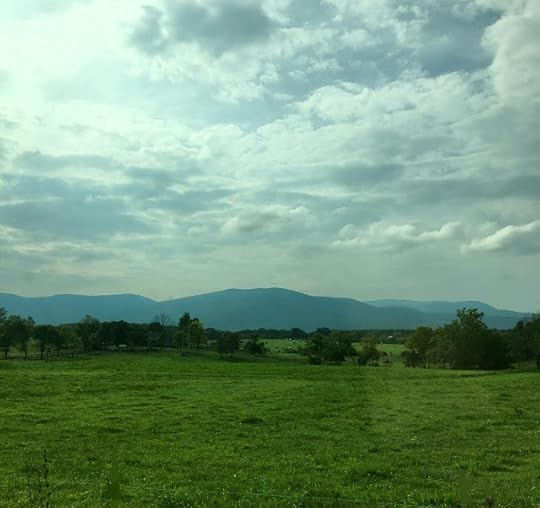

Published on September 03, 2019 08:34
August 31, 2019
On My Work (Fall 2019)
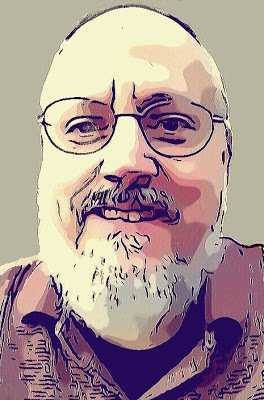 It’s a new academic year. That is always meaningful for me. I thought at the beginning of this year 2019-2020, it would be interesting to put to myself the question, “What do I do?”
It’s a new academic year. That is always meaningful for me. I thought at the beginning of this year 2019-2020, it would be interesting to put to myself the question, “What do I do?”When people ask this question, the “bottom line” is usually directed to the proverbial “putting bread on the table,” and understandably so. Now that it has been a decade since I retired from classroom teaching, I am finally getting to the age where my Emeritus status is no longer utterly peculiar. I am retired from the workforce, a “pensioner” before my time for health reasons after a long period of adult life intensively immersed in stressful, difficult, and absorbing work. The nature of the work is one of the things that broke my health, but that story has been told elsewhere.
Though I cannot hold a regular job (and I am grateful for the provisions in place - to which I contributed extensively in my working years - that have helped support us), I am not by any means “idle.” Teaching is so much more than a job; it is a profession in the classical sense. It is, in the human realm, a vocation, a whole way of life that entails preparation, the conferral of distinctive qualifications, and a level of commitment that orients and forms the mature personality. (I think if we had a more personalistic sense of the nature of human work, we would see that the dignity of “profession” - as a formative basis for different kinds of contribution to human life as interpersonal communion - applies widely to all kinds of fields of human endeavor, and is one aspect of the personal dimension of all human work.)
I am still very much engaged in the academic life: in the university culture, in scholarship and writing. I hope to make some enduring contribution to my own time, and leave some legacy for those who come after me.
What do I do? I am a teacher, by profession. This means being always a scholar, which is really a fancy way of saying "always a student." I am always trying to learn, and to communicate what I learn to others and hopefully inspire them to learn more.
 Limitations, ironically, open up new possibilities. I have some energy for research and writing, which I try to use well. Currently, I have a regular column in Magnificat, this Blog (8+ years running), and other materials that I produce and distribute through digital media and graphics. It's interesting for me to consider that I am probably reaching more people than ever in these ways, even though I can no longer give regular lectures or "be productive" in a manner more consistent with my talents and education.
Limitations, ironically, open up new possibilities. I have some energy for research and writing, which I try to use well. Currently, I have a regular column in Magnificat, this Blog (8+ years running), and other materials that I produce and distribute through digital media and graphics. It's interesting for me to consider that I am probably reaching more people than ever in these ways, even though I can no longer give regular lectures or "be productive" in a manner more consistent with my talents and education.I do what I can. Most people my age are acquainted with their fair share of frustration and failure. We all suffer in different ways, and given my circumstances I can only be grateful for what I am still able to do, however unconventional the ways and unpredictable the patterns may be. Even on the worst days I am still capable of reading (or at least "listening"). Being slowed down has made me more aware of the patience required to learn anything really well.
I do have a number of ongoing research projects that I follow at my own pace. I don't know if I will be able to make any important contributions through these efforts, but I hope I can at least point in certain directions and encourage others to pursue further certain important themes. I have areas of focus in theological and philosophical anthropology, communications media, the impact of globalization, China and East Asia and their historical and current relationship to the West, aesthetic values in contemporary culture, music & art.
If I use "the part of my mind that still works," I still have much to learn and share with others, much to ponder (even when I can't do other things), much to remain engaged with, to hold in solidarity and compassion.
For the rest, I am still learning how to be patient with the peculiarity of my own sufferings. Though I struggle with it, this is probably the most important "work" I'm called to carry out.
Published on August 31, 2019 17:38
August 29, 2019
Everlasting Love
Published on August 29, 2019 12:16
August 28, 2019
Saint Augustine in the Third Millennium
 The great Saint Augustine, whose feast we celebrate today, remains one of the most "accessible" of the first millennium Fathers of the Church. This is all the more true given the fact that he has had a contemporary interpreter: none other than our previous Pope Benedict XVI.
The great Saint Augustine, whose feast we celebrate today, remains one of the most "accessible" of the first millennium Fathers of the Church. This is all the more true given the fact that he has had a contemporary interpreter: none other than our previous Pope Benedict XVI.In the five Wednesday General Audiences he devoted to Saint Augustine in January and February 2008, Pope Benedict presented an erudite summary of Augustine's vast work as well as some beautiful personal reflections on what he has learned from the great Latin Doctor.
Here are some words from Pope Benedict that struck me today:
"When I read St Augustine's writings, I do not get the impression that he is a man who died more or less 1,600 years ago; I feel he is like a man of today: a friend, a contemporary who speaks to me, who speaks to us with his fresh and timely faith. In St Augustine who talks to us, talks to me in his writings, we see the everlasting timeliness of his faith; of the faith that comes from Christ, the Eternal Incarnate Word, Son of God and Son of Man. And we can see that this faith is not of the past although it was preached yesterday; it is still timely today, for Christ is truly yesterday, today and for ever. He is the Way, the Truth and the Life. Thus, St Augustine encourages us to entrust ourselves to this ever-living Christ and in this way find the path of life" (Benedict XVI, General Audience 1/16/2008).
"Faith in Christ made him understand that God, apparently so distant, in reality was not that at all. He in fact made himself near to us, becoming one of us. In this sense, faith in Christ brought Augustine's long search on the journey to truth to completion. Only a God who made himself 'tangible,' one of us, was finally a God to whom he could pray, for whom and with whom he could live. This is the way to take with courage and at the same time with humility, open to a permanent purification which each of us always needs...
"Even today, as in his time, humanity needs to know and above all to live this fundamental reality: God is love, and the encounter with him is the only response to the restlessness of the human heart; a heart inhabited by hope, still perhaps obscure and unconscious in many of our contemporaries but which already today opens us Christians to the future...
"Saint Augustine defines prayer as the expression of desire and affirms that God responds by moving our hearts toward him. On our part we must purify our desires and our hopes to welcome the sweetness of God (cf. In I Ioannis 4, 6). Indeed, only this opening of ourselves to others saves us. Let us pray, therefore, that we can follow the example of this great convert every day of our lives, and in every moment of our life encounter the Lord Jesus, the only One who saves us, purifies us and gives us true joy, true life"
(Benedict XVI, General Audience 2/27/2008).
Some texts from Saint Augustine:
"Who shall bring me to rest in You? Who will send You into my heart so to overwhelm it that my sins shall be blotted out and I may embrace You, my only good?.... Behold, the ears of my heart are before You, O Lord; open them and say to my soul, 'I am your salvation'. I will hasten after that voice, and I will lay hold upon You. Hide not Your face from me" (Confessions, book I:5).
"You had shot at our heart with the arrow of Your love, and we bore Your words transfixed in our breast" (Confessions, book IX:3).
"Late have I loved You, O Beauty ever ancient, ever new, late have I loved You! You called, You shouted, and You broke through my deafness. You flashed, You shone, and You dispelled my blindness. You breathed Your fragrance on me; I drew in breath and now I pant for You. I have tasted You, now I hunger and thirst for more. You touched me, and I burned for Your peace" (Confessions, book X:27).
Published on August 28, 2019 20:52
August 26, 2019
Late Summer's First Cool Air
August is nearly over. A new academic year begins this week at our school and many other universities in the USA.
The heat has broken (at least for a few days) and we have been enjoying some mild temperatures. The days are growing shorter, with sunset before 8PM now.
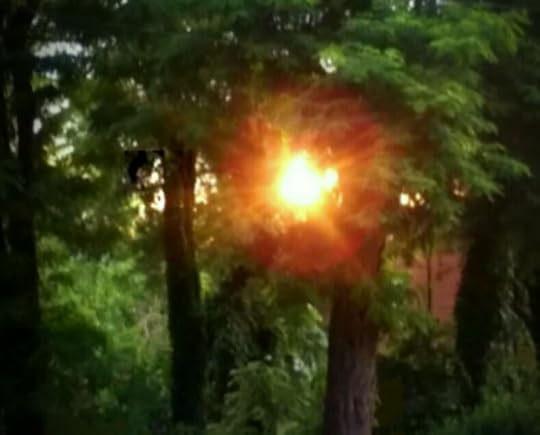
And here are the colorful clouds just before the early sun breaks through and scatters them (at about 6:45 AM in the morning).
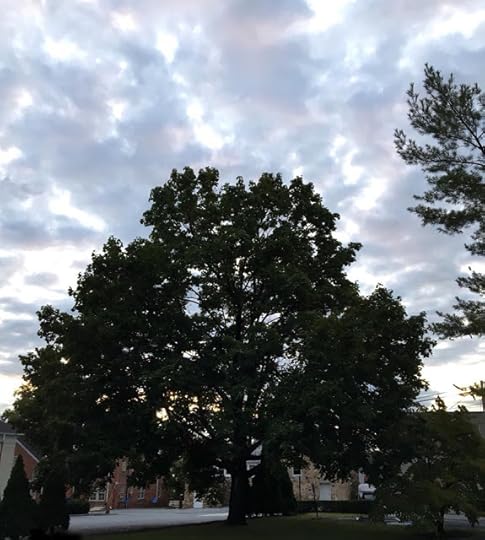
The “Happy Creek” is low, but still flowing on this pretty day.
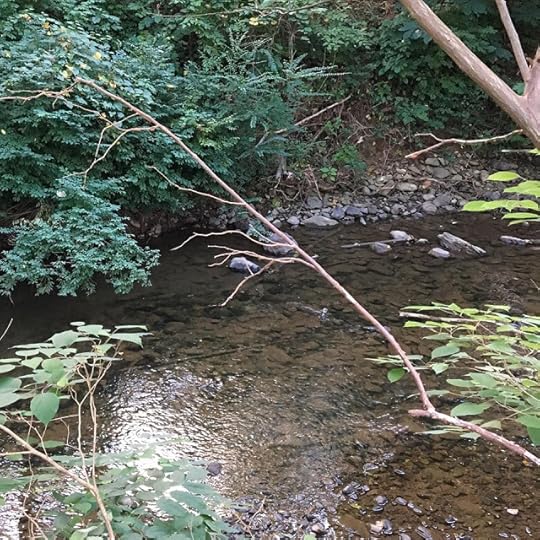
And here is my favorite Sycamore tree in the neighborhood, on the far edge of a horse field. I usually pay more attention to it in Winter, when its bare white branches make such a striking impression as they reach for the sky.
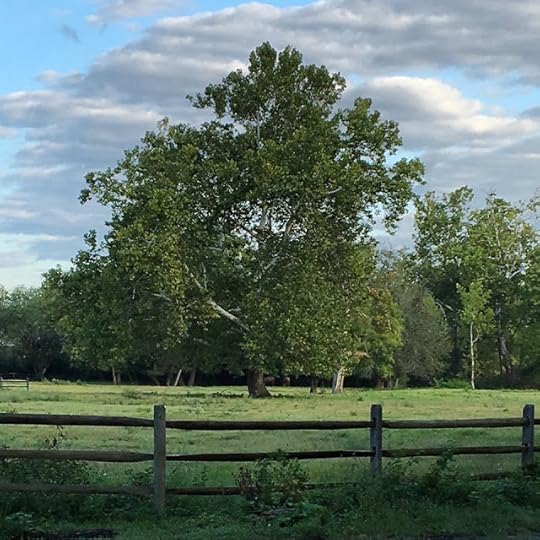
The heat has broken (at least for a few days) and we have been enjoying some mild temperatures. The days are growing shorter, with sunset before 8PM now.

And here are the colorful clouds just before the early sun breaks through and scatters them (at about 6:45 AM in the morning).

The “Happy Creek” is low, but still flowing on this pretty day.

And here is my favorite Sycamore tree in the neighborhood, on the far edge of a horse field. I usually pay more attention to it in Winter, when its bare white branches make such a striking impression as they reach for the sky.

Published on August 26, 2019 19:00
August 25, 2019
“Grant Your People to Love What You Command”
 The Collect for this Sunday and the 21st week of “ordinary time” is a theologically rich prayer.
The Collect for this Sunday and the 21st week of “ordinary time” is a theologically rich prayer. Notice that we ask God to grant us love for His commands. It is God who empowers us to move toward Him, to want to obey His will.
Let us always remember: the Christian life is grace. Ask for grace! Thus the Church prays:
"O God, who cause the minds of the faithful
to unite in a single purpose,
grant your people to love what you command
and to desire what you promise,
that, amid the uncertainties of this world,
our hearts may be fixed on that place
where true gladness is found.
Through our Lord Jesus Christ your Son,
who lives and reigns with you
in the unity of the Holy Spirit,
one God, forever and ever, Amen."
Published on August 25, 2019 20:54
August 23, 2019
Hong Kong People Never Give Up
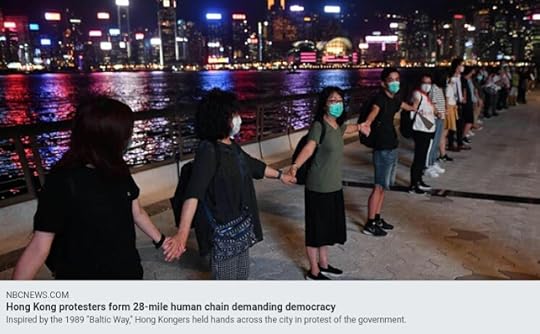
Hong Kong people refuse to give up! Considering all the circumstances, their continued dedication to the course of non-violent protest is remarkable and inspiring.
We are in the midst of the 30th anniversary of the series of events that led to the liberation of Eastern Europe, the melting away of the "Iron Curtain," and the eventual collapse of the Soviet Union.
I remember well these events (including the "Baltic Way" action of August 23, 1989, which inspired this most recent gesture by Hong Kong demonstrators).
The results of 1989 in Europe seemed impossible ... until they happened.
Hong Kong's young people are seeking "the impossible" today.
I can't imagine how they might prevail against the immense political iron fist of China's "Partystate," but this amazing Summer of 2019 may be one step in a long struggle that may yet contain many surprises. Even apparent defeats may lay the foundations for a better future. It is often thus in history.
For now, the Hong Kong demonstrators (with a few possible exceptions on the fringes) appear intent on an intelligent, persistent, non-violent approach. From what I can see, there are various groups with diverse views collaborating in the protests.
They will need heroic patience. At best, they probably are facing a long period of resistance, which is likely to become more difficult, less popular, and more lonely before a breakthrough appears.
Through it all, they must hold fast to their one ineradicable advantage: their humanity. The greatest challenge of non-violence is to persevere even when all seems lost.
Dear Hong Kong people, persevere!
Published on August 23, 2019 14:30
August 22, 2019
A Glorious Crown
"You shall be a glorious crown in the hand of the Lord,
a royal diadem held by your God" (Isaiah 62:3).
The Blessed Virgin Mary, lowly servant, heavenly Queen, Mother of the Lord, our mother.
Salve Regina!
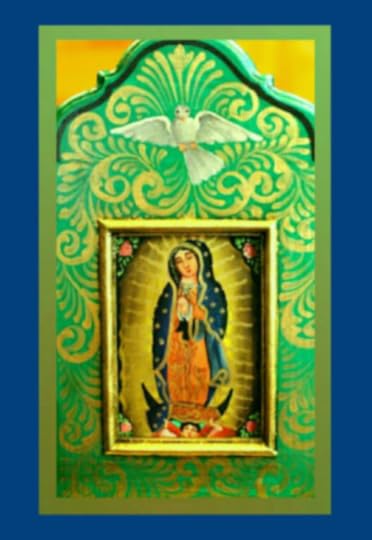 Unknown artist, Mexican folk art
Unknown artist, Mexican folk art
a royal diadem held by your God" (Isaiah 62:3).
The Blessed Virgin Mary, lowly servant, heavenly Queen, Mother of the Lord, our mother.
Salve Regina!
 Unknown artist, Mexican folk art
Unknown artist, Mexican folk art
Published on August 22, 2019 18:19




